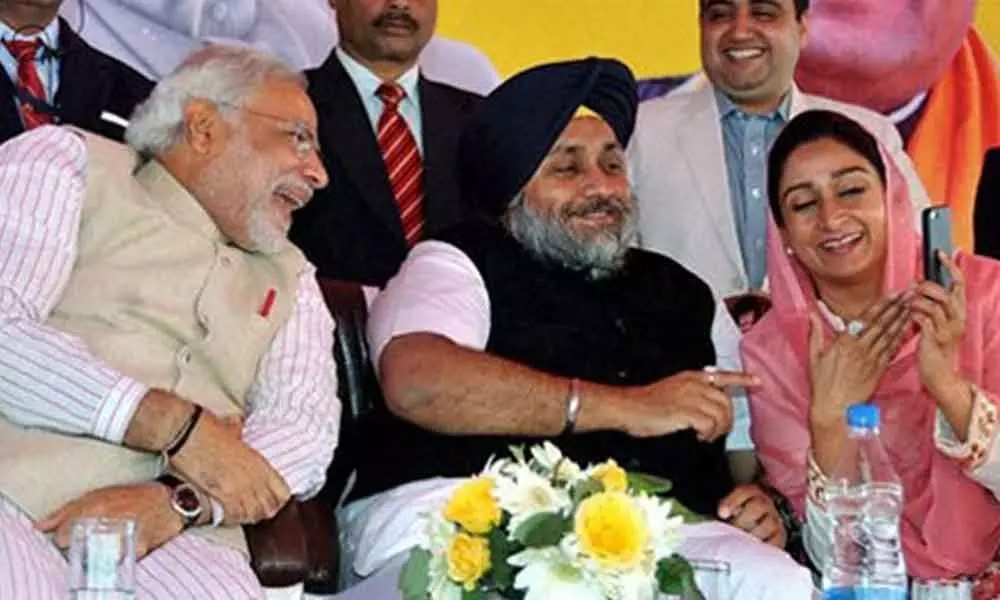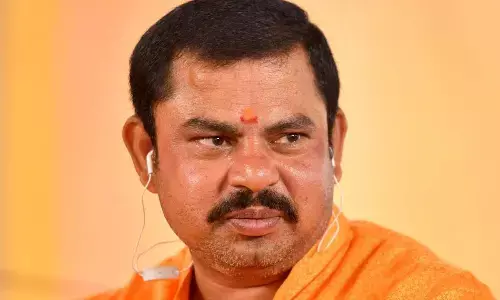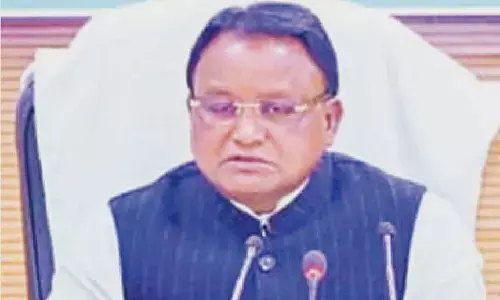Is this a SAD end to NDA?

Prime Minister Narendra Modi
For the first time in six - year NDA rule that too on the day of Prime Minister Narendra Modi’s 70th birthday, it faced revolt from its oldest ally- the Shiromani Akali Dal (SAD).Harsimrat Kaur, sole Minister in the Modi Cabinet from the SAD resigned as Food and Processing Minister in protect against three Agricultural Bills alleging they are anti farmers'bills. These bills were introduced in the ongoing Lok Sabha monsoon session to replace ordinances promulgated in the past.
For the first time in six - year NDA rule that too on the day of Prime Minister Narendra Modi's 70th birthday, it faced revolt from its oldest ally- the Shiromani Akali Dal (SAD).Harsimrat Kaur, sole Minister in the Modi Cabinet from the SAD resigned as Food and Processing Minister in protect against three Agricultural Bills alleging they are anti farmers'bills. These bills were introduced in the ongoing Lok Sabha monsoon session to replace ordinances promulgated in the past.
The three controversial bills are - the Essential Commodities ( Amendment) Bill2020, the Farmers' Produce ,Trade and Commerce (Promotion and Facilitation) Bill 2020 and the Farmers ( Empowerment and Protection) Agreement on Prices Assurance and Farm Services Bill 2020.Among these three bills ,the first one links between Agricultural Produce Prices and Quantity of Produce. It also permits the big farmers and Corporates to hoard large stocks of agricultural produce.
So, it is alleged they can create scarcity of produce artificially for exorbitant prices. The second bill allows the fixation of agricultural produce prices by market forces, in which the farmers are ultimate victims as it is devoid of licence for sellers and buyers. The third bill promotes corporate farming thereby reducing bargaining power of farmers just like Jio mobile service provider which provided service at the lowest price until it emerged as one and only service provider in the market. So, these bills are not only against interests of farmers but also over stepping into States' subject. Moreover these bills destroy the benefits of Green Revolution , MSP and food security. Thus Kaur has taken a good decision by stepping down from the Modi Cabinet and so she has really become loving daughter and beloved sister of farmers across the nation. So, other parties also must think over it and should try to make the Modi government farmer- friendly as agriculture is only sector that registered positive growth even in the midst of Coronavirus.
Pratapa Reddy Yaramala, Tiruvuru
Since the passing of the ordinances on farmers bills in June this year, restless farmers were up in arms against the NDA government over the bills on the ground that it makes them poor and landless in due course. The Centre failing to read the pulse of the agitating farmers and going ahead to get the three controversial bills on agriculture passed in the parliament without a discussion with all stakeholders only goes to show that they are more inclined to help the big business than really helping farmers.
In fact, when agriculture affects the livelihoods of half the population of the country and critical to the nation's food security is in dire need of reforms, it is ironical the government instead of addressing numerous problems facing the nation on various fronts on priority has set out to kill the proverbial golden goose.
As expected, Shiromani Akali Dal like other parties which bank heavily on farmers' votes for their survival, pulling out minister in the union cabinet Harsimrat Kaur Badal in protest against anti-farmer ordinances must serve as an eye-opener to government that it cannot its alliance partners for granted anymore. Further, this has exerted pressure on Haryana where 10 MLAs belonging to JJP are alliance partners of BJP ruled state government to withdraw support.
Even JD(U) in Bihar and other friendly regional parties also seemingly under pressure to act against the NDA government after the three controversial bills on farm reform coming close after Electricity Amendment bill stirred a hornet's nest. The fact that Prime Minister Narendra Modi's assurance that minimum support price would continue and then going all out to assuage the feelings of farmers saying that the three bills are historic and "pro-farmer" in the midst of large-scale protests in Punjab and Haryana could not have much impact on agitating farmers, even as opposition tried to fish in troubled waters by raising their voices against the bills.
The fact of the matter that the Farmers( Empowerment & Protection) Agreement of Price Assurance and farm Services Bill, 2020 affects small farmers from securing the benefit of even small increase in wholesale prices after the new legislation opens the door to corporate business houses in agriculture cannot be brushed under the carpet because it puts farmers at an disadvantage when it comes to compete in the market place even as big business houses holds a sway over the prices.
As the voice of the opposition over the withdrawal of bills has reached a crescendo with slogans like "anti-farmer" with pressure already built with more expected to join, it is time Modi government calls all opposition including the states and farmers' organisations for a detailed discussion instead of rushing up such important bills without a debate in the house to remove irritants.
K R Srinivasan, Secunderabad
This refers to the news item 'PM defends farm bills', The Hans India, September 19. The Modi government mustn't waver on the farm reform legislations despite protests in Punjab and Haryana, which prompted Akali Dal's exit from the ministry. The progressive bills relating to creating a viable alternative to agricultural market produce committees (APMCs) and facilitating contract farming can help small farmers discover fair prices for farm produce and bring better services to the farm gate. APMCs haven't lived up to their promise due to cartelisation and the difficulty of small farmers in transporting their produce to APMC marketyards.
Centre's bold reforms are imperative when the States are unable to usher in such reforms as they are often hostage to big farmer and middlemen lobbies. PM Modi has made a weighty promise to farmers, 86% of whom are small and marginal farmers, to double their incomes by 2022. The status quo, including minimum support price (MSP) isn't helping enough farmers unlike direct benefit transfers, besides distorting markets and cropping patterns too.
The Centre has clarified that it isn't undermining APMCs or MSPs but merely increasing competition by allowing agribusinesses, food processors, wholesalers, exporters and big retailers to source directly from farmers. Opposition parties are joining the protests to reap political mileage, but government must improve its messaging details on the salience of these reforms to enlist the support of the farmers in favour of these progressive reforms.
N Sadhasiva Reddy, Bengaluru










